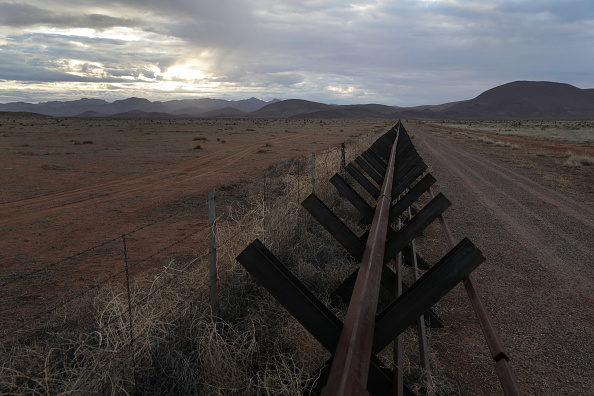
Echoes of America: Remembering what we've lost
Mexican writer Valeria Luiselli’s novel “Lost Children Archive” chronicles losses large and small, that are personal, national, and historical.
“Maybe any understanding, especially historical understanding, requires some kind of reenactment of the past, in its small, outward-branching, and often terrifying possibilities.”
So thinks one of the narrators in Valeria Luiselli’s latest novel, “Lost Children Archive,” as she contemplates how to tell the stories of the “lost children,” migrant children who have arrived at the U.S. border from the Northern Triangle countries of El Salvador, Guatemala, and Honduras, or who have perished in the journey.
She is on a road trip from New York City to the American Southwest, with her husband and their two children, ages 10 and five. As the female narrator wrestles with the question of how to document the story of immigrants at the border, the two children are acting out the stories they have heard from their parents in the backseat of the car—stories of the last warriors of the Apache tribe told to them by the father, who is looking to record echoes of Geronimo and others; stories of the “lost children” riding trains and crossing the border that their mother listens to closely on the radio.

The novel’s central questions about memory (collective and personal), documentation, and understanding were also at the heart of the Mexican writer’s nonfiction work, “Tell Me How it Ends: An Essay in Forty Questions,” published in 2017, which serves as a companion as much as it does a predecessor to “Lost Children Archive.”
Published in 2014, “Tell Me How It Ends” confronted the Central American diaspora—the unaccompanied minors who began to arrive at the southwest border in greater numbers than ever before in the summer of 2014—with a scaffolding of nonfiction inquiry and direct personal experience of the U.S. immigration system, bolstered by interviews which Luiselli had done as an interpreter working with children in the New York City immigration courts.
“Lost Children Archive,” as a work of fiction, functions as an embodiment of the questions Luiselli first raised in “Tell Me How It Ends”: How can we archive what is not recorded by immigration forms, what is intentionally “disappeared”? How can we understand the stories that are not told to us, and never reach us, of children who are so young when they arrive they have no words to describe their experiences, or worse, those who never arrive at all?
To trace the details of the nonfiction work as they emerge in the fictional exploration of the topic—telephone numbers sewn into two migrant sisters’ collars, a desperate mother waiting for her children in New York—is to be guided towards glints of other possibilities and realities beyond the reach of facts to shape the chronicle of absence, of what is not there. By writing about absence—the children who are “lost,” the disruption of family ties, the destruction of nations, the disappearance of love—Luiselli is approaching the vastness of the crisis by edging along its border, searching for echoes, knowing that to view the suffering head on would not just be impossible but, in some ways, insufficient. The numbers of migrant mortality rates aren’t enough. The images of suffering and children in detention camps isn’t enough to begin to communicate across a bridge of empathy.
“Compassion is an unstable emotion. It needs to be translated into action, or it withers,” writes Susan Sontag in her landmark work on photography and human suffering, “Regarding the Pain of Others.”
Luiselli accomplishes a more active, closer understanding when she interweaves the narrative within the narrative: that of the “lost children” or migrant children in the U.S. who are talked about throughout the novel, and the main storyline. A 10-year-old boy and 5-year-old girl are traveling with their parents, and are brother and sister in name if not biologically: the boy is the child of the husband, and his biological mother died in childbirth; the girl, the biological child of the female narrator whose biological father is no longer present. Their deep sibling bond is threatened by the imminent breakup of their parents, due to their diverging professional courses and dreams. Once their road trip reaches their final destination in Arizona, the couple expects to split up, as the husband will stay on to continue his sound project on the Apache tribe with the boy, and the wife and her daughter will return to New York.
In Luiselli’s imaginative but exacting prose, the story of family intersects with the story of nations in a way that is deliberate, and reveals the arbitrariness of both definitions. As they drive through the land of the present-day American southwest, the layers of history and nations to whom it belonged—Apache, Mexico, U.S.—are discussed. In the places the characters go, at the landmarks they visit, they listen to and witness echoes of removal, of deportation, of violent demarcations of land into a nation where some people belong, and others don’t.
Ultimately, the boy’s vision, and his narrative, takes over, and it is through the eyes of a child, and the borderline between a child’s imagination and some version of reality, that a true intersection and overlap of the “lost children” and his quest to save his own family occurs.
Apart from its international scope and resonance, “Lost Children Archive” is a novel for the U.S. literary canon, an American classic that holds the many silences, the many echoes, that are an inextricable part of the fabric of our history and present-day society.











LEAVE A COMMENT:
Join the discussion! Leave a comment.